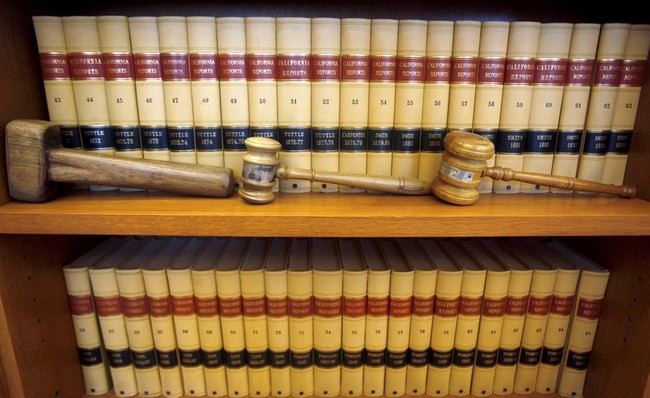
Last week the Washington state Supreme Court ruled that people wanting to become lawyers no longer have to pass the Bar Exam. The traditional Bar Exam will now be just one of three options in the state for those who seek to become licensed.
The Supreme Court of Washington on Friday approved several new ways for attorneys to become licensed that bypass the bar exam — adding momentum to the burgeoning alternative licensure movement.
Washington’s high court approved, opens new tab “in concept” two new licensing pathways for law school graduates. One option is a new apprenticeship program for law school graduates who would work under the supervision of an experienced lawyer for six months then submit a portfolio of work for evaluation. A separate option would allow law students to complete 12 credits of skills coursework and 500 hours of hands-on legal work before graduation, then submit a work portfolio to the Washington State Bar to become licensed.
The changes were proposed by the Washington Bar Licensure Task Force which was created in November of 2020. As you can probably guess from the timing, this was another effort informed by the 2020 zeitgeist. In the actual proposal of changes put before the court, the Task Force made clear this was about equity.
This proposal gives the Washington Supreme Court more responsibility for and control over entry into the legal profession in order to: protect the public and improve trust in the legal profession, advance the cause of diversity equity and inclusion, facilitate lawyer competency, and reduce barriers to entry into the legal profession…
The best available data indicates that the bar exam disproportionately and unnecessarily blocks historically marginalized groups from entering the practice of law. In addition to the racism and classism written into the test itself2 the time and financial costs of the test reinforce historical inequities in our profession.
The document recommends keeping the Bar Exam as an option but only because a new, revised version of the exam is expected to arrive in 2026, one which is also aimed at improving equity.
While race-equity and effectiveness concerns regarding the Uniform Bar Exam (UBE) abound, Washington should continue to offer the UBE as a pathway to licensure. The National Conference of Bar Examiners (NCBE) will begin offering a revised version of the UBE, the Next Gen Exam12, in July 2026…
Information the Task Force has received from the NCBE so far suggests that the Next Gen Exam will address some, though not all, of the race-equity concerns with the current version of the UBE…
…the changes are also intended to make the NextGen Exam a fairer exam than the current UBE.13 Limiting the number of topics tested, reducing the amount of legal information candidates must memorize, shifting the focus of the exam to an integrated and skills oriented format, and deemphasizing speed of performance, will change the way that candidates prepare for the exam, potentially reducing the post-graduation prep time, allowing candidates who have work or family obligations to meet them and enabling the students to move through the exam in a more thoughtful and less “speeded” manner.
In short, the NextGen Exam will be shorter and easier and therefore more equitable. The Task Force also recommends changes to the qualifications for those who wish to take the exam, specifically the requirements that applicants be professional and display “good moral character.” Those qualifications present a problem for equity and are “euphemisms for discrimination” according to the Task Force.
As this article will discuss, the detrimental impact of the current character and fitness inquiry on vulnerable communities is significant. The purported purpose of the inquiry is to assess the morality of the individual in order to protect the public and preserve professionalism. While these goals are laudable, terms like “morality” and “professionalism,” and others used as part of the inquiry, are amorphous at best and often euphemisms for discrimination. In 1957 Justice Black recognized the ambiguity of the term “good moral character” and stated that it only served to reflect “the attitudes, experiences, and prejudices of the definer.” “Professionalism” has also been recognized as a standard historically and arbitrarily defined by proximity to wealth, whiteness, and masculinity. As this article will discuss in further detail, ambiguous terms present a significant barrier to entry for marginalized communities…
Although a “burn it to the ground” approach is tempting and arguably justified for some, the recommendations in this article specifically target requirements that are well-documented contributors to discrimination of marginalized groups.
All of this is happening, apparently, because the current Washington State Bar is 83% white and 56% male in a state that, according to the US Census, is 77% white (and 50% male).
Obviously, if there is a case to be made that specific elements of the Bar Exam are racist in some way, that case should be made and the material reconsidered. But that’s not what these reports present. Instead it’s more of the usual Kendi-style reasoning, i.e. working backwards from demographics. If minority applicants don’t make up the exact percentage of the state bar that they do of the general public then the test must be racist.
This is the same reasoning that leads anti-racists to oppose the SAT for college admission or similar tests for competitive high schools. But as the recent re-adoption of the SAT by several Ivy League schools demonstrates, failure (or success) of one racial group in test results does not prove the test itself is racist and should not be grounds for dropping or simplifying the test. But it seems Washington State’s Supreme Court has decided the allegation is good enough in this case.
